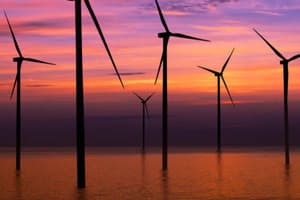Podcast
Questions and Answers
What type of energy is defined as the energy of motion?
What type of energy is defined as the energy of motion?
- Chemical Energy
- Kinetic Energy (correct)
- Thermal Energy
- Potential Energy
Which equation represents gravitational potential energy?
Which equation represents gravitational potential energy?
- PE = mv
- PE = mgh (correct)
- PE = 1/2 mv²
- PE = mg²
What form of energy is involved in the chemical reactions of fuels?
What form of energy is involved in the chemical reactions of fuels?
- Electrical Energy
- Nuclear Energy
- Mechanical Energy
- Chemical Energy (correct)
Which process describes the transfer of heat in a fluid due to movement?
Which process describes the transfer of heat in a fluid due to movement?
What is the rate at which energy is transferred or converted called?
What is the rate at which energy is transferred or converted called?
Which type of energy is NOT accurately described by being stored in chemical bonds?
Which type of energy is NOT accurately described by being stored in chemical bonds?
In which energy transfer method does heat move through electromagnetic waves?
In which energy transfer method does heat move through electromagnetic waves?
Which form of energy is associated with the motion of electrons?
Which form of energy is associated with the motion of electrons?
Which of the following describes the process of changing energy from one form to another?
Which of the following describes the process of changing energy from one form to another?
Which type of energy is an example of energy associated with the temperature of an object?
Which type of energy is an example of energy associated with the temperature of an object?
Flashcards
Kinetic Energy
Kinetic Energy
Energy of motion, dependent on mass and velocity.
Potential Energy
Potential Energy
Stored energy due to position or condition.
Mechanical Energy
Mechanical Energy
Sum of kinetic and potential energy in a system.
Thermal Energy
Thermal Energy
Signup and view all the flashcards
Chemical Energy
Chemical Energy
Signup and view all the flashcards
Conduction
Conduction
Signup and view all the flashcards
Convection
Convection
Signup and view all the flashcards
Radiation
Radiation
Signup and view all the flashcards
Work
Work
Signup and view all the flashcards
Power
Power
Signup and view all the flashcards
Study Notes
Forms of Energy
-
Kinetic Energy
- Energy of motion.
- Depends on mass and velocity (KE = 1/2 mv²).
-
Potential Energy
- Stored energy based on position or condition.
- Gravitational potential energy (PE = mgh) depends on mass (m), gravity (g), and height (h).
-
Mechanical Energy
- Sum of kinetic and potential energy in a system.
- Important in moving machines and physical systems.
-
Thermal Energy
- Energy associated with the temperature of an object.
- Related to the motion of atoms and molecules.
-
Chemical Energy
- Energy stored in chemical bonds.
- Released during chemical reactions (e.g., combustion of fuels).
-
Nuclear Energy
- Energy released during nuclear reactions (fission or fusion).
- Powers stars and can be harnessed in nuclear power plants.
-
Electrical Energy
- Energy from the movement of electrons.
- Used in power generation and electrical devices.
-
Radiant Energy
- Energy carried by electromagnetic waves (e.g., light).
- Important for solar power and photosynthesis.
Energy Transfer
-
Conduction
- Transfer of thermal energy through direct contact between materials.
- Occurs in solids, e.g., heating one end of a metal rod.
-
Convection
- Transfer of heat by the movement of fluids (liquids or gases).
- Warm fluid rises, cool fluid sinks, creating a circulation pattern.
-
Radiation
- Transfer of energy through electromagnetic waves without a medium.
- Example: sunlight heating the Earth.
-
Work
- Energy transfer that occurs when a force is applied over a distance.
- Work is done when a force causes displacement (W = F × d).
-
Power
- Rate at which energy is transferred or converted.
- Measured in watts (1 watt = 1 joule/second).
-
Energy Conversion
- Changing energy from one form to another (e.g., chemical to thermal in a car engine).
- Efficiency of conversion is a key factor in energy use.
-
Conservation of Energy
- Energy cannot be created or destroyed, only transformed.
- Total energy in a closed system remains constant.
Forms of Energy
-
Kinetic Energy
- Represents energy due to motion; calculated using the formula KE = 1/2 mv², where m is mass and v is velocity.
-
Potential Energy
- Refers to stored energy stemming from an object's position or condition; gravitational potential energy is given by PE = mgh, involving mass, gravitational force, and height.
-
Mechanical Energy
- The cumulative energy resulting from both kinetic and potential energy within a system; crucial for the functioning of machines and various physical systems.
-
Thermal Energy
- Associated with the temperature of an object, it is linked to the movement of atoms and molecules, affecting the state of matter.
-
Chemical Energy
- Energy held within chemical bonds of molecules; released during chemical reactions, such as combustion, driving many energy processes.
-
Nuclear Energy
- Derived from reactions during nuclear fission or fusion; essential for powering stars and used in nuclear power plants for energy generation.
-
Electrical Energy
- Generated through the movement of electrons, playing a vital role in power generation and the functionality of electrical devices.
-
Radiant Energy
- Energy transported by electromagnetic waves, such as light; significant in processes like solar power generation and photosynthesis.
Energy Transfer
-
Conduction
- The process of heat transfer through direct contact, most effective in solids; example includes heating one end of a metal rod.
-
Convection
- Involves heat transfer through the circulation of fluids (liquids or gases); warm fluids ascend while cooler ones descend, establishing circulation currents.
-
Radiation
- Energy transfer occurs through electromagnetic waves without needing a material medium; sunlight warming the Earth serves as a prime example.
-
Work
- Describes energy transfer when a force moves an object over a distance, computed as W = F × d, with W representing work.
-
Power
- The measurement of how quickly energy is transferred or converted, quantified in watts, with 1 watt equivalent to 1 joule per second.
-
Energy Conversion
- The transformation of energy from one form to another, such as changing chemical energy to thermal energy in engines; efficiency plays a critical role in energy utilization.
-
Conservation of Energy
- Asserts that energy cannot be created or annihilated, only transmuted; in a closed system, the total energy remains invariant over time.
Studying That Suits You
Use AI to generate personalized quizzes and flashcards to suit your learning preferences.




